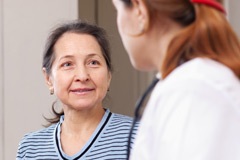About the project
The Living with multiple medicines project is about people’s experiences of taking five or more medicines by seeing and hearing them share their personal stories on film.
Our researcher travelled around Australia to talk to 34 people (including four doctors and one pharmacist) in their own homes or workplaces. Find out what people said about:
- how they feel about taking multiple medicines
- communicating with others
- problems they have with their medicines and how these are resolved.
We hope you find the information helpful and reassuring. All information about the people we spoke to is current as of the time we interviewed them.
An introduction by Professor Ric Day
Ric Day is Professor of Clinical Pharmacology at the University of New South Wales and St Vincent's Hospital, and a clinical pharmacologist and rheumatologist.
Talking points
In this study, we spoke to people who take five or more medicines, including prescription medicines, over-the-counter medicines that are purchased without a prescription (such as paracetamol) and complementary medicines (including natural and herbal medicines; alternative, traditional or holistic remedies; homeopathy; aromatherapy oils; and vitamins and minerals, which can also be part of medical treatment).
The issues raised by the people we spoke to, such as side effects, interactions between medicines, accidental overdosing, forgetting to take medicines and adapting daily routines, may also be relevant to people who are taking fewer than five medicines. However, taking multiple medicines increases the chance of experiencing side effects and interactions.
Perceptions of taking multiple medicines

Hear about what taking multiple medicines means and how people describe positive and negative aspects.
The 'business' of taking multiple medicines

Listen to the procedures and strategies that people adopt to accommodate their medicines in their daily routines.
Issues with taking multiple medicines

Find out about the difficulties people have with multiple medicines and what can go wrong.
Communicating with others

Hear people talk about the responses they receive regarding taking multiple medicines.
Messages to others

Listen to the suggestions for others who take multiple medicines and the people who are close to them.
The Living with multiple medicines project was developed in collaboration with

20-29
30-39
40–49 years
50–59 years
60-69 years
70–79 years
80-89 years
Health professionals
Dr Brendan Beaton
Main occupation: Haemotology Registrar/Fellow
Years in clinical practice: 10
Qualifications: MBBS
Dr Susan Connelly
Main occupation: Geriatrician (specialist in aged care)
Years in clinical practice: 20
Qualifications: MBBS, FRACP
Dr Elisabeth Wearne
Main occupation: General Practitioner
Years in clinical practice: 7
Qualifications: MBBS, FRACGP
A/Prof Sarah Hilmer
Main occupation: Clinical pharmacologist
Years in clinical practice: 16
Qualifications: BScMed (Hons), MBBS (Hons), FRACP, PhD
Emily Klopper
Main occupation: Pharmacist (Managing Partner)
Years in clinical practice: 10
Qualifications: BPharm MPS, Grad Dip ExSci, MEd
The Living with multiple medicines project was developed in collaboration with

We encourage you to always speak to your health professional about your medicines — and before acting on any information you find yourself from other sources.
Health professionals such as doctors, pharmacists and nurses will usually be your best and most reliable source of information about medicines for your individual situation.
The NPS MedicineWise website also provides comprehensive information on medicines, medical tests and other health-related topics for health professionals and consumers.
Organisations providing education, support and information
Arthritis Australia
Provides support and education for Australians with arthritis and their carers.
Asthma Australia
Delivers high-quality support and information to people with asthma and their carers.
Beyondblue
Provides information on managing depression and anxiety. Focuses on improving the health of the whole population, with tailored approaches when working with specific population groups and in different settings – including educational settings, workplaces, health services and online.
Chronic Illness Alliance
Aims to build a better focus in health policy and health services for all people with chronic illnesses. It does this through education and research projects.
Consumers Health Forum of Australia (CHF)
Works to achieve safe, quality, timely healthcare for all Australians, supported by accessible health information and systems.
Council on the Ageing (COTA)
Promotes, improves and protects the circumstances and wellbeing of older people in Australia as citizens and consumers.
Diabetes Australia
Represents all people affected by or at risk of diabetes, their families and carers. It supports diabetes research and provides practical assistance, information and subsidised products to people with diabetes.
Diabetes NSW & ACT
Provides information, support and services to people living with and at risk of diabetes, their families, carers and friends.
Healthtalk Australia
Provides evidenced-based data on people’s experiences of health and illness that will provide information and support, and assist informed decision making.
healthtalk.org
Provides information on a range of illnesses and other health-related issues from seeing and hearing people's real-life experiences.
Kidney Health Australia
Provides a range of programs catered to the needs of people with kidney disease, their families and supporters and other groups.
Leukaemia Foundation
Provides free services to support people with leukaemia, lymphoma, myeloma and related blood disorders, and their families.
Lung Foundation Australia
Supports all aspects of lung health from asthma to cancer to COPD. It runs a toll-free information and patient support centre with a lung care nurse.
National Asthma Council Australia
Provides information and works to improve health outcomes and quality of life for people with asthma.
National Heart Foundation of Australia
Informs the public about cardiovascular disease and assists people living with the condition.
Palliative Care Australia
Represents the interests of all who share the ideal of quality care at the end of life.
Pharmaceutical Benefits Scheme (PBS)
Provides access to necessary medicines for Australians. Under the PBS, the government subsidises the cost of medicine for most medical conditions.
Prostate Cancer Foundation of Australia
Supports men and their families affected by prostate cancer through evidence-based information and resources, support groups and Prostate Cancer Specialist Nurses.
Repatriation Pharmaceutical Benefits Scheme (RPBS)
Provides a wide range of pharmaceuticals and dressings at a concession rate for the treatment of eligible veterans, war widows/widowers and their dependants.
Acknowledgements
This project was conducted at NPS MedicineWise using what is known as the 'DIPEx method', developed by the Health Experiences Research Group at the Department of Primary Care Health Sciences at the University of Oxford, and it was conducted with the support of Healthtalk Australia.
Researcher – Jacqueline Tudball

Jacqueline worked at NPS MedicineWise until 2013 as Senior Research Officer and Acting Team Leader in the former Research and Development team. She is a social scientist and qualitative specialist. She has a PhD in public health from the University of New South Wales.
Credits
We would like to thank all those who took part in the research and shared their experiences so openly and generously.
Study guidance group
- Dr Sally Beath, GP, Sydney
- Alice Bhasale, Consumer Team Leader, Medicines Information, NPS MedicineWise
- Professor Ric Day, Professor of Clinical Pharmacology, St Vincent’s Clinical School, The University of New South Wales, Sydney
- Sue Healy, Consumer Representative
- Professor Elizabeth Manias, Professor, Melbourne School of Health Sciences, The University of Melbourne
- Associate Professor Kath Ryan (Chair), School of Nursing and Midwivery, La Trobe University, Melbourne
- Vanessa Simpson, Medical Writer, NPS MedicineWise
- Sarah Spagnardi, Manager Phone Line Services, NPS MedicineWise
- Dr Lorraine Smith (Project Adviser), Senior Lecturer, Faculty of Pharmacy, The University of Sydney
NPS MedicineWise staff
- Uli Eichhorn, Digital Team
- Vanessa Simpson, Medicines Information
- Tessa Morgan, Program Evaluation
- Judy Raymond, Program Design
- Margaret Williamson, Medicines Insight
External contractor
Donna Larcos, Data4Research
Organisations that assisted with recruitment
- Australian Diabetes Council, NSW
- Council of the Ageing (COTA) South Australia
- Council of the Ageing (COTA) Victoria
- Kidney Health Australia
- Leukaemia Foundation
- Pharmacy Express, Corrimal
We also thank colleagues and friends who assisted with recruitment.
Organisations that assisted this project
- DIPEx Australia consortium



- Health Experiences Research Group, Department of Primary Care and Health Sciences, The University of Oxford
This project was approved by the Australian Commonwealth Department of Health Human Research Ethics Committee and funded by the Australian Commonwealth Department of Health.
The Living with multiple medicines project was developed in collaboration with

